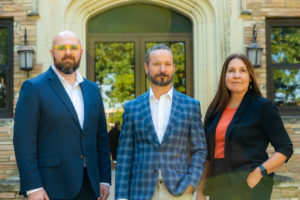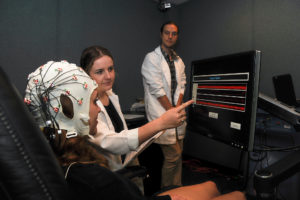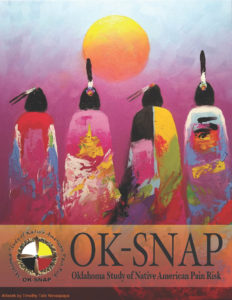
Director of the Psychophysiology Laboratory for Affective Neuroscience (PLAN) and Professor of Psychology Jamie Rhudy began his journey at The University of Tulsa nearly 20 years ago. A human pain physiology expert, Rhudy is a recipient of the prestigious Outstanding Teacher Award as well as the Outstanding Researcher Award, which he received for his work on identifying mechanisms, or reasons/factors for pain disparity, that contribute to chronic pain, particularly within Native American populations. This study sought to develop noninvasive methods for assessing individuals at risk for chronic pain.
This semester, the National Institutes of Health (NIH) awarded Rhudy a $514,891 grant for the first year of his research on Native American pain inequity. The approved grant will provide approximately $2.75 million during the projected five-year award. The project, known as the Oklahoma Study of Native American Pain Risk (OK-SNAP), continues the professor’s previous study, which proposed that Native Americans experience chronic pain at higher levels than any other ethnic group in the United States. Rhudy’s prior investigation confirmed this suggestion and found that Native Americans develop chronic pain at nearly three times the rate of non-Hispanic whites.
“The new study will look at the contribution of sociocultural factors, like structural racism and discrimination, and allostatic load (stress-related wear and tear on the body) on mechanisms of the Native American pain inequity,” said Rhudy. “The project will also attempt to identify factors that promote resiliency that protect against these harmful influences in Native Americans.”
Requisite expertise

Composed of equally qualified and eager scholars, Rhudy’s team is well-equipped for the research at hand. Native American health and culture expert Joanna Shadlow of Oklahoma State University, racial inequality expert and TU Associate Professor of Sociology Travis Lowe and stress physiology expert William Lovallo of the University of Oklahoma Health Sciences Center are all heavily invested in OK-SNAP’s mission. Additionally, the team has assembled an Indigenous Advisory Council of five Native American experts from academia and the community to oversee the project.
Having spent the past decade studying physiological and sociocultural pain risk mechanisms in Native Americans, developing strong relationships with Native American partners such as the Cherokee Nation, the Indian Healthcare Resource Center and the Oklahoma City Area Indian Health Service has been vital to the team’s unique research. “Our lab is one of few in the U.S. with the merit to assess the implicit measure of spinal sensitization, or the physiological amplification of pain signals within the spinal cord during stress,” said Rhudy. “We’re also the only team in the U.S. attempting to identify the mechanisms of Native American pain inequity and the only team with the collective expertise to successfully execute this project.”

Students and experienced researchers alike are taking part in this novel research, and clinical psychology doctoral student Parker Kell has been a force in OK-SNAP’s progression. Kell noted that his involvement with the project has been nothing short of amazing. Aside from learning about chronic pain risk in an underserved and understudied population, Kell maintained that one of the most rewarding aspects is community outreach. “Doing this type of health disparity research requires community engagement, which has been a whole new side to research for me,” he said. The team plans to follow up with participants in the study to determine whether they have developed chronic pain. “Because of this,” Kell said, “we’ll have a strong study design for establishing which factors measured during the study could predict chronic pain onset.”
Confronting inequality

With Oklahoma being home to 38 federally recognized tribes, Shadlow is eager to see how the project will help them to better understand the structural factors that are contributing to the pain disparity: “Over time we may be able to really make a difference in the lives of Native Americans that are living with chronic pain.”
The benefits of this study are manifold and extend beyond laboratory investigations. The conclusions garnered from OK-SNAP research will help guide policy decisions to reduce Native American pain inequity, support a shift in the standards of how Native American pain risk is conceptualized, construct an accurate medicinal approach to the prevention of and care for Native American pain and disability and address understudied health inequities in an underserved population.
“Racial and economic health divides are among the most pressing issues in our country today,” said Lowe. “OK-SNAP’s research has a laser focus on understanding the specific but often invisible mechanisms that drive such inequalities.”
Beginning in February, students and scholars will contribute to Oklahoma’s groundbreaking research. Considering the outstanding team Rhudy has built over the years, the research is bound to generate life-changing results.
Want to know more about the project’s ongoing progression? Stay up to date by contacting Jamie Rhudy at jamie-rhudy@utulsa.edu or call the Lorton Hall 102 lab at 918-631-3565.






